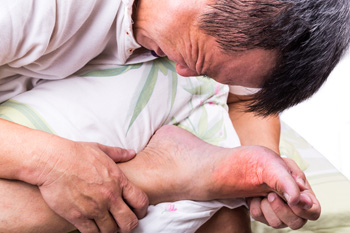
Gout is a form of arthritis caused by the accumulation of uric acid crystals in joints. These crystals, which frequently form primarily in the big toe, can lead to severe pain, inflammation, and ultimately joint damage. Causes of gout include dietary choices of high-purine foods such as red meat, seafood, and alcohol. Additionally, genetics can influence gout susceptibility, and a family history of the condition increases the risk. Medical conditions such as obesity, hypertension, and kidney disease also contribute to gout development. Several treatment options are available to manage gout. Lifestyle adjustments are key, including adopting a low-purine diet, reducing alcohol intake, and maintaining a healthy body weight. Anti-inflammatory drugs and urate-lowering medication, can effectively reduce the strength of symptoms and prevent flare-ups. Resting the affected joint and elevating it can help alleviate pain, while the application of ice during an attack and heat during recovery aids in reducing discomfort. Ignoring this condition can lead to serious joint problems. If you're experiencing gout symptoms, it is suggested that you seek prompt care from a podiatrist.
Gout is a painful condition that can be treated. If you are seeking treatment, contact Zina Cappiello, DPM from Dr. Zina B. Cappiello DPM, LLC. Our podiatrist will treat your foot and ankle needs.
What Is Gout?
Gout is a form of arthritis that is characterized by sudden, severe attacks of pain, redness, and tenderness in the joints. The condition usually affects the joint at the base of the big toe. A gout attack can occur at any random time, such as the middle of the night while you are asleep.
Symptoms
- Intense Joint Pain - Usually around the large joint of your big toe, and it most severe within the first four to twelve hours
- Lingering Discomfort - Joint discomfort may last from a few days to a few weeks
- Inflammation and Redness -Affected joints may become swollen, tender, warm and red
- Limited Range of Motion - May experience a decrease in joint mobility
Risk Factors
- Genetics - If family members have gout, you’re more likely to have it
- Medications - Diuretic medications can raise uric acid levels
- Gender/Age - Gout is more common in men until the age of 60. It is believed that estrogen protects women until that point
- Diet - Eating red meat and shellfish increases your risk
- Alcohol - Having more than two alcoholic drinks per day increases your risk
- Obesity - Obese people are at a higher risk for gout
Prior to visiting your podiatrist to receive treatment for gout, there are a few things you should do beforehand. If you have gout you should write down your symptoms--including when they started and how often you experience them, important medical information you may have, and any questions you may have. Writing down these three things will help your podiatrist in assessing your specific situation so that he or she may provide the best route of treatment for you.
If you have any questions, please feel free to contact our office located in Clifton, NJ . We offer the newest diagnostic and treatment technologies for all your foot care needs.
